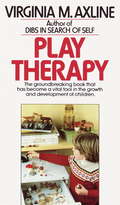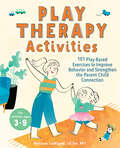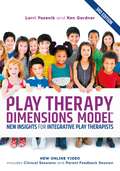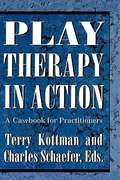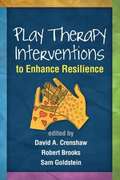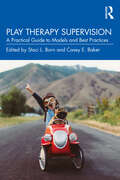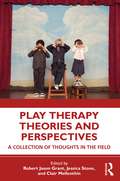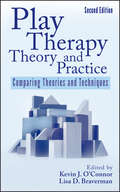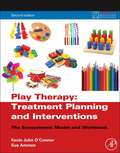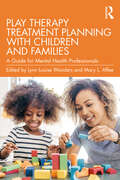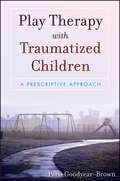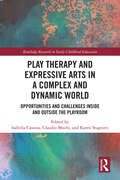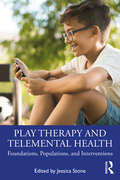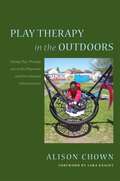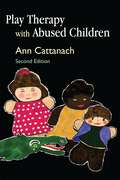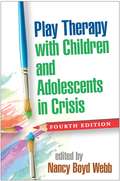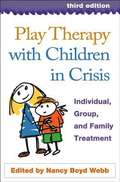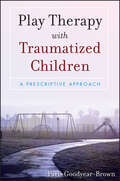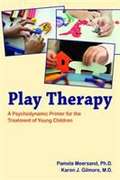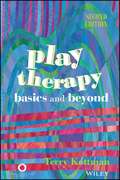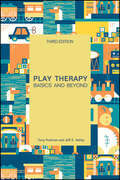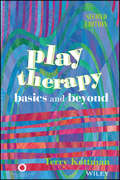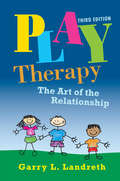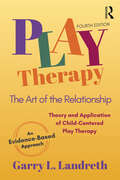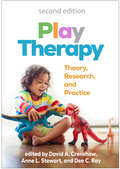- Table View
- List View
Play Therapy
by Virginia M. Axline"The most brilliant and intuitive, as well as the clearest written, work in this field. It is unpretentious yet clearly the most authoritative work that has been published."NORMAN CAMERON, Ph.D.Professor of PsychiatryYale University School of MedicineHere is an intensely practical book that gives specific illustrations of how therapy can be implemented in play contacts, and tells how the toys of the playroom can be vivid performers and aids in growth. As she did with DIBS IN SEARCH OF SELF, Dr. Axline has taken true case histories from the rich mine of verbatim case material of children referred for play therapy, choosing children ranging in age, problem, and personality. It's all here in an important and rewarding book for parents, teachers, and anyone who comes in contact with children.From the Paperback edition.
Play Therapy Activities: 101 Play-Based Exercises to Improve Behavior and Strengthen the Parent-Child Connection
by Melissa LaVigne LCSW, RPTHarness the power of play—101 creative ways for you and your child to bond, have fun, and so much more!What's the best way for children to relate to the world around them? Play! In this book, you'll find a collection of joyful activities that allow parents of children ages 3 to 9 to unlock the therapeutic benefits of play.From strengthening your bond to decreasing their screen dependency, Play Therapy Activities offers a variety of simple exercises that can help improve your child's behavior, impulse control, self-awareness, and more. New to the idea of play therapy? This parent-friendly guide offers a comprehensive overview of the practice, as well as advice for making sure you and your child get the most out of your experiences together.Play Therapy Activities provides:Open the play therapy toolbox—Discover how you can help your child hone certain skills and behaviors with arts and crafts, relaxation and breathing activities, and more.101 Fun activities—Whether it's dancing, creating stories, or playing outside, discover on- and off-the-page activities (and tips!) for any number of occasions and moods.Play therapy revealed—Find out how and why play therapy is so effective, as well as the ways in which these activities can supplement actual play therapy.Bring fun and skill-building games home with Play Therapy Activities.
Play Therapy Dimensions Model: New Insights for Integrative Play Therapists (3rd edition)
by Ken Gardner Lorri YasenikAn updated take on a fundamental decision-making framework, this practical guide explores the dimensions of play therapy and how they apply to today's practitioner. In-depth case studies illustrate the interplay between theory and practice, demonstrating an integrative case conceptualization approach. Scales have been updated to reflect current best practice and developments in the field, and combine with the core decision-making framework for a deeper, expanded use of the model. New chapters delve into parent work and case conceptualization utilizing observational and self-reflective forms. Downloadable video content brings the text to life, including a new video illustrating the essentials of consultation with parents. The interface between practitioner and client also takes centre stage. New sections on self-reflection and cultural sensitivity guide you through ways to foster a welcoming, compassionate environment throughout your practice. Whether you're a seasoned play therapist or just starting out, this fresh take on the dimensions of play therapy will foster self-reflection of the who, what, when, why, and how of play therapy.
Play Therapy In Action: A Casebook For Practitioners
by Charles Schaefer Terry KottmanThis book brings together in a single volume concrete applications of play therapy by seasoned clinicians from various theoretical perspectives. The goal is to reflect the broad spectrum of approaches that now exist in the field. The major psychopathologies in children present the therapist with different problems and therefore require different approaches. Another guiding belief underlying this volume is that descriptive studies that carefully detail psychotherapy process are among the most useful and practical resources for both students and practicing therapists. This casebook offers step-by-step treatment guidelines for a number of childhood difficulties, including internalizing, externalizing, and post-traumatic disorders. It should be of interest to both students and more advanced practitioners in a variety of mental health disciplines, including social work; psychiatry; clinical, counseling, and school psychology; expressive arts therapy; child-life therapy; and psychiatric nursing.
Play Therapy Interventions to Enhance Resilience
by Robert Brooks Sam Goldstein David A. CrenshawThe importance of therapeutic play in helping children recover from adversity has long been recognized. This unique volume brings together experts on resilience, trauma, and play therapy to describe effective treatment approaches in this key area. The book begins by providing guiding principles for intervention and describing the specific properties of play that promote resilience. Subsequent chapters delve into clinical applications, including such strategies as storytelling and metaphors, sand play, art therapy, play therapy adaptations for school settings, group interventions, and the use of therapeutic writing. Rich case studies and vignettes demonstrate creative ways to bolster at-risk children's strengths and enhance their natural capacity to thrive.
Play Therapy Supervision: A Practical Guide to Models and Best Practices
by Staci L. Born and Casey E. BakerPlay therapy is one of the fastest-growing specialty areas in mental health. Understanding the skills, knowledge, and strategies that make play therapy supervision effective is essential in supporting the integrity and needs of a thriving field. Play Therapy Supervision: A Practical Guide to Models and Best Practices is an all-encompassing play therapy supervision compendium. In these pages, current and prospective play therapy professionals and supervisors will find effective strategies for engaging in supervision, with literature that is firmly rooted in empirical research, and practical examples. Useful for novice and experienced supervisors, this book describes best practices in supervision and contemporary topics for building an effective play therapy supervision practice. This text also emphasizes the critical importance of cultural humility in play therapy supervision. Other important features include: Ethical and legal issues in play therapy supervision Building a play therapy supervision relationship Evaluation in play therapy supervision Technology in play therapy supervision, including extended reality School-based play therapy supervision Techniques in play therapy supervision: mindfulness, sand tray, self-compassion, art and movement, and more!
Play Therapy Theories and Perspectives: A Collection of Thoughts in the Field
by Robert Jason GrantThis book explores the multitude of thoughts, theories, opinions, methods, and approaches to play therapy in order to highlight the unity and diversity of theory and perspective in the field. Each chapter is a common question related to play therapy to which ten established and experienced play therapists share their thoughts, theoretical perspectives, and opinions. The key characteristics of a well-trained play therapist, the role of technology in play therapy, the importance of speaking the client’s language, and many more frequently asked play therapy questions and topics are explored. The reader will learn about the umbrella of play therapy thought and practice and connect with perspectives that might align with their own theoretical preferences. This book will be of interest to a wide range of mental health professionals working with children and adolescents. Those new to play therapy and those who are seasoned veterans will appreciate, value, and hopefully be challenged by the differing viewpoints surrounding many play therapy topics.
Play Therapy Theory and Practice
by Lisa D. Braverman Kevin J. O'ConnorPlay Therapy Theory and Practice, Second Edition is edited by one of the foremost authorities on play therapy. This new edition of the best selling book on the theory and practice of play therapy provides an up-to-date guide to the ten major approaches to play therapy. The new edition covers bipolar and ADHD diagnosis and the use of psychotropic medications. In addition, it covers the use of major models of play therapy. The therapist looking to sharpen skills and students seeking initial training will benefit greatly from this book.
Play Therapy Treatment Planning And Interventions: The Ecosystemic Model And Workbook (Practical Resources For The Mental Health Professional)
by Kevin John O'Connor Sue AmmenPlay Therapy: Treatment Planning and Interventions: The Ecosystemic Model and Workbook, 2e, provides key information on one of the most rapidly developing and growing areas of therapy. Ecosystemic play therapy is a dynamic integrated therapeutic model for addressing the mental health needs of children and their families. The book is designed to help play therapists develop specific treatment goals and focused treatment plans as now required by many regulating agencies and third-party payers. Treatment planning is based on a comprehensive case conceptualization that is developmentally organized, strength-based, and grounded in an ecosystemic context of multiple interacting systems. <p><p> The text presents guidelines for interviewing clients and families as well as pretreatment assessments and data gathering for ecosystemic case conceptualization. The therapist's theoretical model, expertise, and context are considered. The book includes descriptions of actual play therapy activities organized by social-emotional developmental levels of the children. Any preparation the therapist may need to complete before the session is identified, as is the outcome the therapist may expect. Each activity description ends with a suggestion about how the therapist might follow up on the content and experience in future sessions. The activity descriptions are practical and geared to the child. Case examples and completed sections of the workbook are provided. It provides the therapist with an easy-to-use format for recording critical case information, specific treatment goals, and the overall treatment plan. Workbook templates can be downloaded and adapted for the therapist's professional practice.
Play Therapy Treatment Planning with Children and Families: A Guide for Mental Health Professionals
by Lynn Louise Wonders Mary L. AffeePlay Therapy Treatment Planning with Children and Families is a comprehensive guide that provides an integrative and prescriptive approach to creating customized treatment plans. It’s an excellent textbook for graduate programs in social work, counseling, and family therapy and an invaluable guide for practicing clinicians in all settings.After exploring and explaining the many modalities for treating children and adolescents, this book provides sample treatment plans using a variety of case vignettes. Chapters also take readers through a road map for case conceptualization, meeting with caregivers, problem identification, goal development, diagnosis determination, determination of interventions and termination, and much more.
Play Therapy With Traumatized Children: A Prescriptive Approach
by Paris Goodyear-BrownIntroducing a practical model of play therapy for traumatized children Some of the most rewarding work a therapist can do is help a child recover from a traumatic event. But where to begin? A growing body of play therapy literature offers many specific techniques and a variety of theoretical models; however, many therapists are still searching for a comprehensive model of treatment that incorporates solid theoretical constructs with effective play therapy interventions. Clinicians have long recognized that trauma therapy is not just a matter of techniques but a journey with a beginning, middle, and end. In a pioneering contribution to the field, Play Therapy with Traumatized Children: A Prescriptive Approach, the author codifies the process in her model, Flexibly Sequential Play Therapy (FSPT). Integrating non-directive and directive approaches, this components-based model allows for the uniqueness of each child to be valued while providing a safe, systematic journey towards trauma resolution. The FSPT model demystifies play-based trauma treatment by outlining the scope and sequence of posttraumatic play therapy and providing detailed guidance for clinicians at each step of the process. Dramatically demonstrating the process of healing in case histories drawn from fifteen years of clinical practice with traumatized children, Play Therapy with Traumatized Children addresses: -Creating a safe place for trauma processing -Augmenting the child's adaptive coping strategies and soothing his or her physiology -Correcting the child's cognitive distortions -Ensuring that caregivers are facilitative partners in treatment Inviting gradual exposure to trauma content through play -Creating developmentally sensitive trauma narratives -Using termination to make positive meaning of the post-trauma self.
Play Therapy and Expressive Arts in a Complex and Dynamic World: Opportunities and Challenges Inside and Outside the Playroom (Routledge Research in Early Childhood Education)
by Karen Stagnitti Isabella Cassina Claudio MochiThis book offers cutting-edge expertise and knowledge in new and developing play therapy, therapeutic play, and expressive arts for families and children in crisis and challenging situations. The book focuses on the use of play therapies in complex and dynamic situations such as pandemics, post-disaster conditions, crisis, migration, poverty, and deprivation. Evidence in the book is rooted in theory and contains examples of direct clinical experiences of play therapy approaches by the authors from across six continents, offering innovative methods to apply expressive arts modalities across different situations. It highlights the need to understand the context and needs of the children and families in their particular situations and provides examples of application of therapeutic principles and techniques in individual and group settings and within schools and communities. With reflections and guidance on how to support children in reaching their potential in a variety of difficult contexts, the book will be key reading for scholars and researchers in the fields of play therapy, expressive arts therapies, and creative psychotherapy, as well as professionals in these areas.
Play Therapy and Telemental Health: Foundations, Populations, and Interventions
by Jessica StonePlay Therapy and Telemental Health gives clinicians the tools they need to bring their therapy sessions online. Chapters present the fundamentals of play therapy and telemental health therapy and introduce play therapists to a variety of special populations and interventions specific to telemental health. Expert contributors discuss using a wide variety of telehealth interventions— including Virtual Sandtray®©, nature play, and EMDR —with children affected by autism, trauma, and more. Readers will learn how the fundamentals of play therapy can be expanded to provide effective treatment in web-based sessions. This is a vital guide for any clinician working in play therapy in the 21st century.
Play Therapy in the Outdoors: Taking Play Therapy out of the Playroom and into Natural Environments
by Sara Knight Alison ChownChampioning the therapeutic power of nature, this book explores why outdoor play therapy offers children more than being confined to a playroom and how practice can be moved into the natural environment in a safe and ethical way. By using outdoor environments, the traditional dyadic relationship between the therapist and the child becomes a triadic one in which the therapeutic process is enhanced and the environment for the play therapy is shared and therefore more 'democratic'. The child can develop a lifelong therapeutic attachment to the 'nature mother' which supports the development of the body self and a growing recognition of our interdependence with nature. The author explores how this is achievable in practice and the benefits to children with a wide range of needs including profound and multiple learning difficulties (PMLD), complex social, emotional and behavioural problems (SEBD) and attachment issues. Synthesising traditions of using outdoor spaces in a therapeutic context with approaches from educational perspectives, this book offers a theoretically-sound and practical framework for taking play therapy into natural environments.
Play Therapy with Abused Children: Second Edition
by Ann CattanachPraise for the first edition: `Ann Cattanach writes with enormous empathy and warmth, and with a refreshing lack of sentimentality ... [This] is an unpretentious and optimistic book, and a very positive addition to recent publications.' - British Association of Play Therapists `I would recommend the book to anyone working in this field... This is a well presented, clear and easy-to-read book, providing a balanced mixture of factual information and case material.' - British Journal of Occupational Therapy `What impressed me so much about this work was Cattanach's knowledge of children and their inherent strengths as well as their vulnerabilities... This practical and easy to apply book is recommended for anyone who works with abused children and would like further insight as well as practical and informative advice on healing the traumatized child.' - Trauma and Loss: Research and Interventions `Her accounts of the way in which play is used to make sense of traumatic experiences are full of insight and often moving. All aspects of the work are covered... This is an exceptional volume...goes far beyond a mere text book.' - Therapy Weekly This second edition of Ann Cattanach's highly commended book explores the use of play therapy with abused children as a way of helping them heal their distress and make sense of their experiences through expanding their own creativity in play. The book provides practical ways of starting play therapy with abused children and explains how the child can use this process for healing. Models of intervention are described with consideration given to the particular needs of the child and the work setting of the therapist. Suggestions include short and medium term interventions, individual/group and sibling work. This edition provides new case study material, up-to-date information on relevant legislation on children's rights and welfare and recent developments in research in the field. This book is essential reading for professionals working with abused children, as well as those interested in the use of creative therapies.
Play Therapy with Children and Adolescents in Crisis, Fourth Edition
by Nancy Boyd Webb MD Lenore C. TerrThis widely used practitioner resource and course text is considered the most comprehensive guide to working with children who have experienced major losses, family upheavals, violence in the school or community, and other traumatic events. Leading experts present a range of play and creative arts therapy techniques in chapters organized around in-depth case examples. Informed by the latest knowledge on crisis intervention and trauma, the book now encompasses work with adolescents as well as younger children. Each chapter concludes with instructive questions for study or reflection. New to This Edition *Expanded age range: now includes expressive therapy approaches for adolescents. *More attention to traumatic stress reactions and posttraumatic stress disorder (PTSD); several chapters address complex trauma. *Extensively revised with the latest theory, practices, and research; many new authors. *Additional topics: parental substance abuse, group work with adolescents, chronic medical conditions, animal-assisted play therapy and courtroom testimony, and more.
Play Therapy with Children in Crisis, Third Edition
by Nancy WebbHEOA Compliance Copy July 2011This practical casebook and widely adopted text presents effective, creative approaches to helping children who have experienced such stressful situations as parental death or divorce, abuse and neglect, violence in the school or community, and natural disasters. New to This Edition Incorporates advances in knowledge on crisis intervention, trauma, and short-term play therapy. 17 of the 21 chapters are entirely new. Additional topics parental military deployment, the impact of Hurricane Katrina on families, immigration-related trauma, terrorism, and disrupted adoption.
Play Therapy with Traumatized Children
by Goodyear-Brown ParisIntroducing a practical model of play therapy for traumatized children Some of the most rewarding work a therapist can do is help a child recover from a traumatic event. But where to begin? A growing body of play therapy literature offers many specific techniques and a variety of theoretical models; however, many therapists are still searching for a comprehensive model of treatment that incorporates solid theoretical constructs with effective play therapy interventions. Clinicians have long recognized that trauma therapy is not just a matter of techniques but a journey with a beginning, middle, and end. In a pioneering contribution to the field, Play Therapy with Traumatized Children: A Prescriptive Approach, the author codifies the process in her model, Flexibly Sequential Play Therapy (FSPT). Integrating non-directive and directive approaches, this components-based model allows for the uniqueness of each child to be valued while providing a safe, systematic journey towards trauma resolution. The FSPT model demystifies play-based trauma treatment by outlining the scope and sequence of posttraumatic play therapy and providing detailed guidance for clinicians at each step of the process. Dramatically demonstrating the process of healing in case histories drawn from fifteen years of clinical practice with traumatized children, Play Therapy with Traumatized Children addresses: Creating a safe place for trauma processing Augmenting the child's adaptive coping strategies and soothing his or her physiology Correcting the child's cognitive distortions Ensuring that caregivers are facilitative partners in treatment Inviting gradual exposure to trauma content through play Creating developmentally sensitive trauma narratives Using termination to make positive meaning of the post-trauma self
Play Therapy: A Psychodynamic Primer for the Treatment of Young Children, First Edition
by M. D. Pamela Meersand Karen J. GilmoreA Psychodynamic Primer for the Treatment of Young Children provides a contemporary, comprehensive exploration of the theory and technique of psychoanalytically oriented play therapy, addressing both the dearth of writings on these topics and the frequent lack of in-depth education on the basic principles and practice of psychodynamic play therapy offered by contemporary training programs for child clinicians.
Play Therapy: Basics And Beyond
by Terry KottmanWritten for use in play therapy and child counseling courses, this extraordinarily practical text provides a detailed examination of basic and advanced play therapy concepts and skills and guidance on when and how to use them. Kottman's multitheoretical approach and wealth of explicit techniques are also helpful for clinicians who want to gain greater insight into children's minds and enhance therapeutic communication through the power of play. After a discussion of the basic concepts and logistical aspects of play therapy, Kottman illustrates commonly used play therapy skills and more advanced skills. Introduced in this edition is a new chapter on working with parents and teachers to increase the effectiveness of play therapy. Practice exercises and "Questions to Ponder" throughout the text facilitate the skill-building and self-examination process.
Play Therapy: Basics and Beyond
by Terry Kottman Jeffrey S. AshbyPlay Therapy: Basics and Beyond is a comprehensive and insightful guide to the practice of play therapy. Presenting foundational and advanced skills with humor and fun, this book brings the practice of play therapy to life through real-life examples, interactive exercises, and thought-provoking reflections. For those new to play therapy or seeking to deepen their expertise, Play Therapy: Basics and Beyond offers both a proven methodology and practice tools for counselors to connect with their child clients in deeply meaningful ways. To purchase print copies, please visit the ACA Store. Reproduction requests for material from books published by ACA or any other questions about ACA Publications should be directed to publications@counseling.org. ACA will provide one complimentary Desk Copy to faculty and other instructors who have adopted an ACA text for their course. To request a Desk Copy, please go to: https://www.counseling.org/publications/overview/product-ordering-information Digital evaluation copies may be requested from Wiley by clicking the link above and completing the details about your institution and course.
Play Therapy: Basics and Beyond (Creative Arts And Play Therapy Ser.)
by Terry KottmanWritten for use in play therapy and child counseling courses, this extraordinarily practical text provides a detailed examination of basic and advanced play therapy concepts and skills and guidance on when and how to use them. Kottman’s multitheoretical approach and wealth of explicit techniques are also helpful for clinicians who want to gain greater insight into children’s minds and enhance therapeutic communication through the power of play. After a discussion of the basic concepts and logistical aspects of play therapy, Kottman illustrates commonly used play therapy skills and more advanced skills. Introduced in this edition is a new chapter on working with parents and teachers to increase the effectiveness of play therapy. Practice exercises and “Questions to Ponder” throughout the text facilitate the skill-building and self-examination process. *Requests for digital versions from ACA can be found on www.wiley.com. *To purchase print copies, please visit the ACA website *Reproduction requests for material from books published by ACA should be directed to permissions@counseling.org
Play Therapy: The Art of the Relationship
by Garry L. LandrethPlay Therapy: The Art of the Relationship is the newest incarnation of Garry Landreth's comprehensive text on creating therapeutic relationships with children through play. It details the Child-Centered Play Therapy model, which stresses the importance of understanding the child's world and perspective. This approach facilitates the play therapy process while allowing therapist and client to fully connect. Professors who have taught a course based on the previous edition will be pleased to find the core message intact, but updated with a significant body of recent research. Expanded to cover additional topics of interest, the new edition includes: a full chapter on current research in play therapy new sections on supervising play therapists, legal and ethical issues and multicultural concerns 30 new photographs that show the author demonstrating techniques in-session practical tips for working with parents instructions on play room set-up and materials online instructor resources. The Third Edition will feel both familiar and fresh to educators and trainers who have relied on Landreth's text for years. The guidelines, transcripts, and case examples offered help therapists govern sensitive issues at every stage of the therapeutic process, from the first meeting to the end of the relationship.
Play Therapy: The Art of the Relationship
by Garry L. LandrethThis is the latest edition of Garry Landreth’s comprehensive text on creating therapeutic relationships with children through play. This book details Child-Centered Play Therapy (CCPT), an evidence-based model, which stresses the importance of understanding the child’s world. Professors who have taught a course based on the previous editions will be pleased to find the core message intact but updated with a comprehensive review of rigorous contemporary research demonstrating the strong evidence base for CCPT across cultural groups and presenting issues. Expanded to cover additional topics of interest, this new edition includes a model of the change process in CCPT and 13 new Rules of Thumb that help clarify the CCPT relationship, and discusses deeper issues in CCPT, such as recognizing emotional blocks in play therapy, being culturally responsive, discovering meaning when there seems to be no meaning, and more. This new edition offers essential help to play therapists who respond to sensitive issues at every stage of the therapeutic process.
Play Therapy: Theory, Research, and Practice
by David A. Crenshaw Anne L. Stewart Dee C. RayNow in a significantly revised second edition featuring 85% new material, this authoritative play therapy reference and text comprehensively reviews the current state of the field. Expert contributors describe theoretical foundations, showcase widely used clinical approaches, and explore challenging and timely professional issues. The book presents vivid case illustrations and synthesizes the play therapy research base. Chapters on specific populations (such as neurodivergent children, culturally diverse children, adolescents) and clinical problems (such as trauma, disrupted attachment, anxiety) provide engaging course content and the knowledge therapists need to tailor interventions effectively. New to This Edition *Chapters on Gestalt play therapy, prescriptive play therapy, group play therapy, and nature-based play therapy. *Chapters on racial trauma, chronic illness, depression and suicidality, and attachment trauma. *Chapters on working with infants and parents, immigrant children and families, and LGBTQIA+ youth. *Chapters on telemental health, resilience, parent consultation, and working within child protection and legal systems. *Enhanced focus on research, with new coeditor Dee C. Ray bringing particular expertise.
